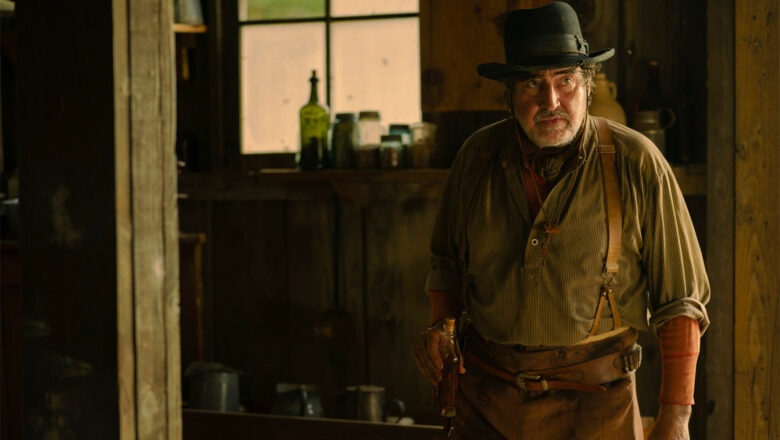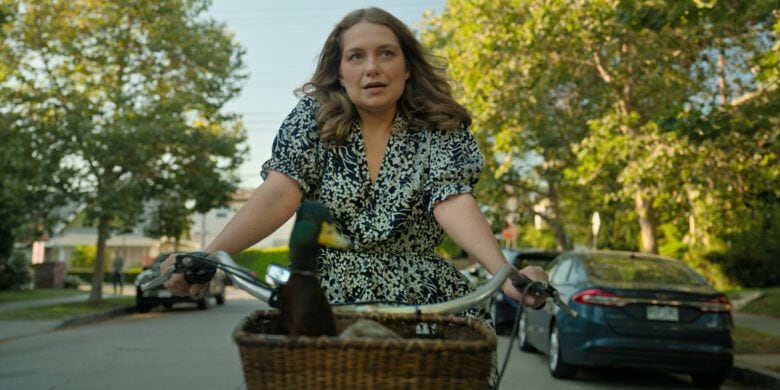Apple TV+’s newest series is Roar, an anthology series based on the short story collection by Cecelia Ahern. Shepherded by Glow showrunners and playwrights Liz Flahive and Carly Mensch, the show is a collection of vignettes shot and presented in roughly the same style.
Each takes on a different facet of womanhood. And each contains some element of magical realism. The first season, which debuts Friday, seems like a mixed bag, to put it delicately. But the high points of these “feminist fables” prove high indeed.
Roar review
Across eight episodes based on chapters in Ahern’s short story collection, we see the different troubles experienced by a group of women in different cities, continents, economic brackets, etc., as they experience the microaggressions and slights that make up their experiences in public life.
Creators are talked out of authorship of their work and then their lives. Grave consequences await working mothers who can’t admit they need help. Victims of incel culture must solve their own murders. And women get fed up with their husbands and workaday lives.
At the end, each woman’s story comes to the closest thing to a satisfying conclusion possible, given the odd circumstances.
The problem with happy endings
The happy endings are part of the problem with Roar, but I understand the impulse. The show introduces eight different sets of lives with myriad problems and allow all of the central characters to walk away with dignity and pride in themselves.
We see eight incarnations where problems as big as supernatural teeth marks, a verbally abusive talking animal boyfriend, a mother slowly dying, and a husband content to turn a wife literally into an object for display are all kinda wrapped up. (Grammatically speaking, anyway. You know — triumphant, happy music, smiles on the faces of major characters, arcs completed.)
The thorniness introduced here is intended to unsettle you. So it’s kind of a cop-out that every one of the episodes ends with the characters loving life, even if that’s perhaps the kind of thing people need to see right now.
I am the eye of the tiger

Liz Flahive and Carly Mensch did a much more untidy job running Glow, the Netflix show about female professional wrestlers. (Between this and Physical, Apple TV+ clearly watched their careers with interest, which to me begs the question: Why not just buy Glow from Netflix and produce the much-desired fourth season? They could trade them Ted Lasso and then I’d never have to review that show again.)
Glow’s roster of complicated, impulse-driven women snorting, drinking, puking and wrestling their way across the ’80s seemed a little more at peace with the idea of irreconcilable differences than Roar does.
You didn’t expect any of the major problems to be resolved because that wasn’t exactly the hand women were dealt in the 1980s. It’s not the hand they’re dealt now, either, which I would have preferred to see in Roar.
‘The Woman Who Was Kept on a Shelf’
The closest Roar comes to a true bummer ending among these eight stories can be found in two chapters. So Yong Kim (Lovesong, For Ellen and about two dozen recent TV credits) directs one of them, “The Woman Who Was Kept on a Shelf.” It stars Glow’s Betty Gilpin and Daniel Dae Kim (Lost, Hawaii Five-0). Australian commercial and music video director Kim Gehrig helms the other: “The Woman Who Ate Photographs,” starring Nicole Kidman, Simon Baker and the legend Judy Davis.
In the former, Gilpin’s millionaire husband builds her a shelf in his office so she can sit there inspiring him as he works and becomes richer. Of course, within a few months he gets sick of the sight of her and they turn his desk around so she suddenly must amuse herself. (This move seems to have been borrowed from the newly rediscovered George A. Romero movie, The Amusement Park).
The short runs into trouble because she gets down and then runs free, dancing and having fun all over town until suddenly the music stops and she realizes no one cares about her out here, either. The cavorting lasts about three minutes too long.
The ending puts her back on a shelf, but she’s running her own shop. She’s finally kinda, sorta in charge of her own destiny. However, the awkward smile on her face says maybe this isn’t the happy arrangement she thought it might be. That’s the kind of ambiguity I wanted a little more of from Roar.
‘The Woman Who Ate Photographs’
“The Woman Who Ate Photographs” is as good as Roar gets. Kidman and Baker, both using their native Aussie accents (swoon), play a couple who’ve been married long enough that their eldest son is going off to college. They have the same troubles as any couple, but they’re both slightly nervous that the problems are about to be compounded by the arrival of Kidman’s mother, played by Judy Davis.
Davis is only 12 years older than Kidman, so the math doesn’t quite work, but who cares? Watching Davis act is one of the top 10 reasons to watch any moving image. Kidman served as producer for Roar, so clearly she didn’t care, either. She just wanted to give Davis the stage.
Their road trip to bring Davis to live out the rest of her years in the departing son’s bedroom is a prickly affair, with Davis taking every chance to belittle Kidman for caring as much as she does. As they go, Kidman sifts through old photo books from her childhood and eats the pictures of the supposedly happier times.
There’s no point in having these nice memories preserved — they were lies. She doesn’t like her mother; in fact, they never got along. The blank slate is more fitting a tribute to their relationship. Kidman, Baker and Davis handily carry this with their easy charisma and spiky interpersonal dynamic. I loved this. It stands as one of the strongest episodes of television I’ll see all year.
And you’re gonna hear me

The rest of the episodes have things to recommend them but don’t hang together. An episode about an author (played by Issa Rae) who is betrayed by executives has too much on its mind and too tidy a conclusion. She’s going invisible and she has to rescue her intellectual property from a room full of white men who are turning her trauma into a VR experience that includes unprocessed memories of her father.
This has roots in Ralph Ellison and afrofuturism, and there’s a stunning sequence where Rae relives her father’s death in a VR headset. However, it ends with her triumphantly marching into a party to tell off the executives, which we don’t see. It’s stunningly unsatisfying, considering the monstrosity of misperception and theft we’ve seen take place.
A Western and more
There’s also a semi-charming Western outing (featuring a pathetically villainous turn by an always-welcome Alfred Molina), which turns into a fairly ordinary buddy comedy with another too-happy ending. Plus, there’s a story of a woman (Meera Syal) who returns her husband (Bernard White) to a department store. That episode is rescued by cultural specificity, courtesy of writer Vera Santamaria and the charming lead performances.
The great Cynthia Erivo enlivens a story of a woman undergoing a horrific biological trauma that turns out to be an easy metaphor for her life.
Alison Brie stars in the weakest episode of the bunch, in which she plays a ghost watching a detective (Hugh Dancy) fail to solve her murder. The dark punchline is that it was her best friend’s incel little brother. It’s believable, but also unsatisfying. And most of the episode consists of the exact ghost jokes you’ve seen in 10,000 movies and TV shows in this vein.
‘The Woman Who Was Fed by a Duck’

Photo: Apple TV+
The one episode I found myself enjoying moment to moment in the way likely intended by the writers was “The Woman Who Was Fed by a Duck,“ directed by Flahive. The wonderful Merritt Wever (Nurse Jackie, Godless) plays a woman charmed by a magical talking duck (voiced by Weeds‘ Justin Kirk).
At first, she just brings him food in the park. Then she invites him home. And then he moves in and they start having sex. Wever stands as one of the great character actors in America. So it was never less than exciting seeing where the episode would go, if only because I wanted desperately to see which notes she’d hit.
The story ends on a too-clean note of empowerment — like the rest of Roar’s episodes — but it’s good to enjoy uninterrupted time with Wever, giving a great performance in a risky short.
Watch Roar on Apple TV+
All eight episodes of Roar premiere April 14 on Apple TV+.
Rated: TV-MA
Watch on: Apple TV+
Scout Tafoya is a film and TV critic, director and creator of the long-running video essay series The Unloved for RogerEbert.com. He has written for The Village Voice, Film Comment, The Los Angeles Review of Books and Nylon Magazine. He is the author of Cinemaphagy: On the Psychedelic Classical Form of Tobe Hooper, the director of 25 feature films, and the director and editor of more than 300 video essays, which can be found at Patreon.com/honorszombie.
![Roar’s star-studded feminist fables fall for the happy ending [Apple TV+ review] Roar review: Nicole Kidman stars in the standout episode of this anthology series.](https://www.cultofmac.com/wp-content/uploads/2022/04/Roar_Photo_010201-1536x1152.jpg)

